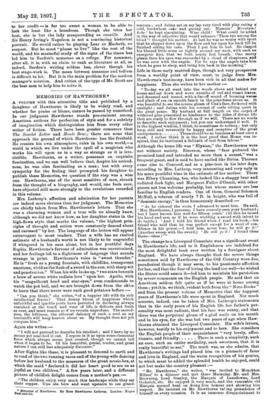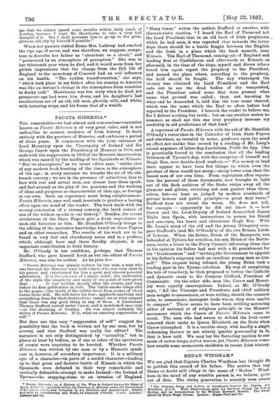MEMORIES OF HAWTHORNE.*
A VOLUME with this attractive title and published by a daughter of Hawthorne is likely to be widely read, and whether for praise or blame, cannot be passed by unnoticed. In our judgment Hawthorne stands pre-eminent among American authors for perfection of style and for a subtlety of imagination which distinguishes him from every other writer of fiction. There have been greater romances than The Scarlet Letter and Monte Beni ; there are none that approach the ground of which Hawthorne has the freehold. He creates his own atmosphere, rules in his own world,—a
world in which we live under the spell of a magician who works his will upon us in a way as strange as it is irre- sistible. Hawthorne, as a writer, possesses an exquisite fascination, and we can well believe that, despite his retired- ness, he was also fascinating as a man ; but with every sympathy for the feeling that prompted his daughter to publish these Memories, we question if the step was a wise one. Hawthorne, one of the most sensitive of men, shrank from the thought of a biography, and would, one feels sure, have objected still more strongly to the revelations recorded in this volume.
Mrs. Lathrop's affection and admiration for her parents are indeed more obvious than her judgment. The Memories are chiefly taken from Mrs. Hawthorn's letters. That she was a charming woman and a true wife we already knew, although we did not know how, as her daughter states in the high-flown style that marks the volume, "the highest prin- ciples of thought and action were constantly danced about and caressed" by her. The language of the letters will appear extravagant to most readers. That a wife has an exalted estimate of a husband's worth is not likely to be ungrateful
if whispered in his ears alone, but in her youthful days Sophia Hawthorne's fervour of admiration was unrestrained, and her feelings led to a flightiness of language that sounds strange in print. Hawthorne's voice is " sweet thunder." He is "fresh as a young fountain, with childlike, transparent emotions; vivid as the flash of a sword in the sun, with sharp wit and penetration." When his wife looks up, " two stars beneath a brow of serene white radiate love " upon her. Apollo, with his " magnificent head and star-eyes," even condescends to watch the pot boil, and we are brought down from the skies to learn that there never were such good potatoes before :- "Can you think," she writes, "of a happier life with its rich intellectual feasts ? That downy bloom of happiness which unfaithful and ignoble poets have persisted in declaring always vanished at the touch and wear of life, is delicate and fresh as ever, and must remain so if we remain unprofane. The sacred- ness, the loftiness, the ethereal delicacy of such a soul as my husband's will keep heaven about us. My thought does not yet compass him."
Again she writes :-
" I will not pretend to describe his intellect ; and I have by no means yet searched it out. I repose in it as upon some elemental force which always seems just created, though we cannot tell when it began to be. Of his beautiful, genial, tender, and great nature I can still less adequately discourse."
After flights like these, it is pleasant to descend to earth and to read of the two running races and of the young wife dancing before her husband to the measures of the great music-box, at which the maid " declared it did her heart good to see us as joyful as two children." A few years later, and a different picture of childish delight comes from a mother's pen :—
"The children enjoy very much this landscape while they eat their supper. Una ate hers and went upstairs to see grand-
Memories of Hawthorne. By Rose Hawthorne Lathrop. London: Kogan Paul and Co. mamma ; and Julian sat on my lap very tired with play eating It cold, buckwheat cake and gazing out. Mamma! Mountain! Lake ! he kept ejaculating. Wise child ! What could be added in the way of adjective that would enhance Thou eye among the blind' ! thought his mother. At last he was so weary with sport that he slipped down upon the floor and lay upon his back till he finished eating his cake. Then I put him to bed. He clasped his blessed little arms so tightly around my neck, with such an energetic kiss, that we both nearly lost breath. One merry gleam from his eyes was succeeded by a cloud of sleepiness, and he was soon with the angels. For he says the angels take him when he goes to sleep, and bring him back in the morning."
Life in those early married days, though not very prosperous from a worldly point of view, must, to judge from Mrs. Hawthorne's testimony, have been rich in all that makes for happiness. Thus she writes to her mother :—
" To-day we all went into the woods above and behind our house and sat down and wove wreaths of red and russet leaves, and dreamed and mused, with a far-off sound of booming waves and plash of sea on smooth beach in the pine-trees above us. It was beautiful to see the serene gleam of Una's face, fleckered with sunlight ; and Julian with his coronet of curls sitting quiet in the great peace. My husband at full length on the carpet of withered pine presented no hindrance to the tides of divine life that are ready to flow through us if we will. There are no words to describe such enjoyment; but you can understand it well. It is the highest wisdom, I think, to sometimes do nothing ; but only keep still and reverently be happy and receptive of the great
omnipresence There should be no business at least once a week. I rather think it is the best proof that Moses was in- spired, that be instituted a Sabbath of rest from labour."
Although the home life was " Elysian," the Hawthornes were not without society. Emerson, whose "face pictured the promised land and intruded no more than a sunset," was a frequent guest, and is said to have smiled like Sirius. Thoreau came also to Concord, sad as a pine-tree in his later days, according to Mrs. Lathrop, very interesting and very ugly in his more youthful time in the estimate of her mother. There was Ellery Channing, too, who looked like a shaggy bear and radiated dark light, and Margaret Fuller d'Ossoli, with other guests not less welcome probably, but whose names are less familiar to English readers. One of them, General Solomon McNeil, a veteran of nearly 7 ft. in height, who was full of "demonic energy," is thus humorously described :— " As he entered the room I advanced to meet him. He said, ' Mrs. Hawthorne, I presume. I have scarcely seen your husband ; but I have known him well for fifteen years.' (At this he raised his hand and arm as if he were wielding a sword with intent to do battle.) And I told his friend when I read his book,—his friend who said that he was perfect except for a want of con- fidence in his power,—I told him, never fear, he will go it!' (Another sweep with the sword.) ' He will go it ! I found ideas there—ideas !'" The change to a Liverpool Consulate was a significant event in Hawthorne's life, and to it Englishmen are indebted for the most delightful book ever written by a foreigner about England. We have always thought that the severe things sometimes said by Hawthorne of the Old Country were due, paradoxical though it may seem, to his passionate affection for her, and that the fear of loving the land too well—he wished the States could annex it—led him to maintain his patriotism by severe comments on the English people. He said that an American seldom felt quite as if he were at home among them ; yet it is, we think, evident both from the " Note-Books " and from the present volume of Memories that the happiest years of Hawthorne's life were spent in England. Not much account, indeed, can be taken of Mrs. Lathrop's statements that in the early years of his English life her father's per- sonality was most radiant, that his face was sunny, and that there was the perpetual gleam of a glad smile on his mouth and in his eyes, for she was but two years of age when Haw- thorne obtained the Liverpool Consulate. His wife's letters,
however, testify to his enjoyment and to hers. She considers the English people of their acquaintance " very lovely, affec- tionate, and friendly There is such a simplicity, such an ease, such an entire cordiality, such sweetness, that it is really beautiful to see." The truth was, as she admits, that Hawthorne's writings had placed him on a pinnacle of fame and love in England, and the warm recognition of his genius, to which must be added the splendid health he enjoyed, could not but make the country pleasant :-
" Mr. Hawthorne," she writes, " was invited to Monckton Milnes' to a clejeuner and met there Macaulay, Mr. and Mrs. Browning, Lord Stanley, the Marquis of Lansdowne, Lord Goderich, etc. He enjoyed it very much, and the venerable old Marquis seemed bent on doing him honour and showing him respect. He insisted on Mr. Hawthorne tal-ing precedence of himself on every occasion. It is an immense disappointment to me that we cannot spend some months within daily reach of London, because I want Mr. Hawthorne to take a very full draught of it. But I shall persuade him to go up to the grim, glorious old city by himself if possible."
When her parents visited Rome Mrs. Lathrop had reached the ripe age of seven, and was therefore, we suppose, compe- tent to describe her father as "absorbent as a cloud," and "permeated by an atmosphere of perception." She was in her thirteenth year when he died, and it would seem from her girlish impressions that the change from the full life of England to the monotony of Concord had an evil influence on his health. "The sudden transformation," she says, "which took place in my father after his coming to America was like an instant's change in the atmosphere from sunshine to dusky cold." Hawthorne was but sixty when he died, yet premature age had worn him down, and his daughter's last recollections are of an old, old man, ghostly, still, and white, with tottering steps, and his frame that of a wraith.







































 Previous page
Previous page